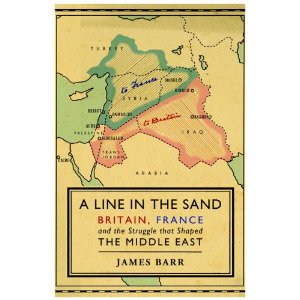The Blurb
In 1916, in the middle of the First World War, two men secretly agreed to divide the Middle East between them. Sir Mark Sykes was a visionary politician; François Georges-Picot a diplomat with a grudge. The deal they struck, which was designed to relieve tensions that threatened to engulf the Entente Cordiale, drew a line in the sand from the Mediterranean to the Persian frontier. Territory north of that stark line would go to France; land south of it, to Britain. The creation of Britain’s ‘mandates’ of Palestine, Transjordan and Iraq, and France’s in Lebanon and Syria, made the two powers uneasy neighbours for the following thirty years.
Through a stellar cast of politicians, diplomats, spies and soldiers, including T. E. Lawrence, Winston Churchill and Charles de Gaulle, Barr vividly tells the story of the short but crucial era when Britain and France ruled the Middle East. It explains exactly how the old antagonism between these two powers inflamed the more familiar modern rivalry between the Arabs and the Jews, and ultimately led to war between the British and French in 1941 and between the Arabs and Jews in 1948.
In 1946, after many years of intrigue and espionage, Britain succeeded in ousting France from Lebanon and Syria, and hoped that, having done so, it would be able to cling on to Palestine. Using newly declassified papers from the British and French archives, James Barr brings this clandestine struggle back to life, and reveals, for the first time, the stunning way in which the French finally got their revenge.

The Review
The blurb above gives you a good all-round picture of the scope of this book. The first thing I should point out is that this book reads like a well written novel. Any history book holds the possibility of killing a subject with a dry regurgitation of facts. The skill lies in presenting them in such a way as to make them interesting, relevant, and memorable. James Barr has achieved this with consummate ease. I don’t say that lightly – I’ve always read quite a lot of history books and some of them tried to write in a novelistic way and failed miserably. They tend to indulge two serious errors: they get too flowery, using a lot of adjectives and pointless description; they write as if the historical figures are characters in a book – and so start telling us what they were thinking (without and evidence to back it up) Many’s the history book I’ve flung across the room after a few pages of twaddle like that. Anyway, I only mention it because this book reads like a novel – but in the good ways. Barr does not claim to know what a character was thinking – unless there is a diary or letter to back it up. He does not sink into the mire of purple prose. He keeps it moving. He kept me interested.
This was a little like one of those crime novels where we know who dies and we just want to find out who did it and why. There must have been countless points where it could have turned out differently. Moments in history where the Middle East could have developed into a peacefully place – even with a Jewish homeland integrated there somewhere. For that to have happened there would have had to have been no oil and no Suez. Even with the British holding on to Suez it might have been OK – had the British politians really been interested in peace and the handover of power. However, once oil entered the equation there never was going to be a peaceful solution. The British of the time played the part of the modern day Americans: lots of talk about liberty and self-determination but only if that meant getting or keeping the oil. There were one or two noble figures along the way, along with a few sad victims. Like today the real victims are the people who live in war torn lands because the people around them want more; more land, status, oil, power…
If you are interested in this period of history or this region you should buy this book (or borrow it from the library). If you want to get an idea of why there are so many problems in the Middle East today – read this book. The period covers the incubation, birth and nursery of the present day struggles. It feels impartial, perhaps with a very slight English bias. You don’t need any prior knowledge (I didn’t really have any) and the book is pretty much jargon free. It is also an entertaining read.
Barr has written another book: Setting the Desert on Fire: T.E. Lawrence and Britain’s Secret War in Arabia, 1916-18 which is now on my Amazon wish list (I’m a bit skint at the moment else I’d have bought it already.
If you are reading this Mr. Barr, James, would you mind writing a book about France in the 1930’s. The one’s I have got are rather dry and exceedingly stuffy and I would so like to read an interesting one.
James Barr is on twitter as @James_Barr he also has a web site: http://www.jamesbarr.org.uk. This book was published by Simon and Schuster who kindly sent me this copy to review. I am on Twitter too as @sethlynch
A Line in the Sand: Britain, France and the Struggle That Shaped the Middle East, James Barr
Hardcover: 464 pages
Publisher: Simon & Schuster Ltd (4 Aug 2011)
Language English
ISBN-10: 1847374530
ISBN-13: 978-1847374530
Product Dimensions: 23.6 x 15.2 x 4 cm


